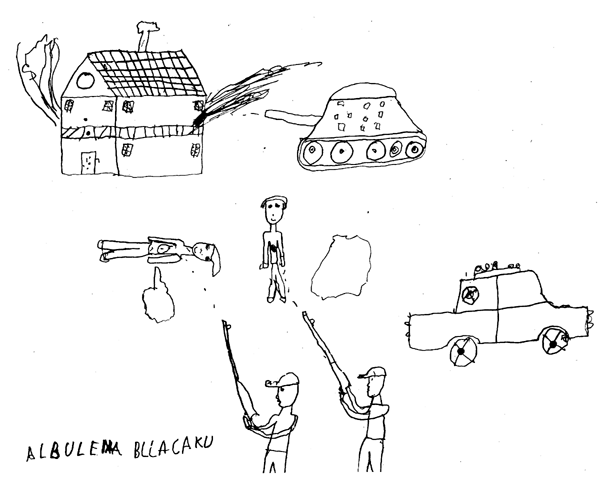
| One of a series of pictures drawn by children at the Neprostino refugee
camp in Macedonia during the NATO intervention in Kosovo and collected
by the British government. ( click here to view the exhibition
or view the official Biritish Ministry of Defense website
on Operation Allied Force)
|
 |
1. Do you agree with Walzer that notions of justice and morality can be usefully applied to the logic and conduct of war? If so, then whom is the debate intended for and what purpose does it serve - is it a means of reassuring oneself of the righteousness of one's actions, a necessary element in the debate within the state over public actions, or does it have an international role? If you disagree, how do you account for Walzer's argument that we do not "simply tell one another, brutally and directly, what we wanted to do or have done…the truth is that one of the things most of us want, even in war, is to act or be seen to act morally?" Walzer concludes in part that "some costs can never rightly be paid," in other words there are situations when everything is permissible. If this is the case, then how are limits, gradations, and permissible contexts to be determined?
2. How does Walzer use
the concept of aggression to build his theory of the morality of engaging
in warfare (jus ad bellum)? What do you make of his argument about "the
rights of political communities" and his discussion of the principles of
"common government" and possession of territory? Do Walzer's amendments
to the legalist paradigm (prudent intervention and anticipatory actions)
result in an unworkable mass, which only applies to a narrow set of states
and cases, or do they produce a realistically flexible and comprehensive
theory? How would you apply these principles to evaluate the morality of
the U.S. Civil War, the expansion of the U.S. across North America, Germany's
role in both World Wars, and the recent NATO intervention in Kosovo?
3. How does the Walzer's
concept of the morality of the conduct of war (jus in bello) differ from
the morality of its initiation? Do you believe the tenets "soldiers are
made to be killed but no one else is" or that a soldier "can only attack
if a direct attack is possible" are robust enough to serve as rules in
the conduct of war? How would you determine how wide the permissible target
set should be (e.g. only an actively engaged enemy solider, any enemy soldiers
in uniform, workers employed in a munitions plant, etc.) and how broadly
should the concept of accountability be applied (e.g. to private soldiers,
officers, political leaders, active voters, etc.)? How would you apply
your conclusions to slaughter of prisoners at Agincourt, the allegations
of U.S. atrocities during the Korean War, or the fictional dilemma faced
by Capt. Miller in Saving Private Ryan?